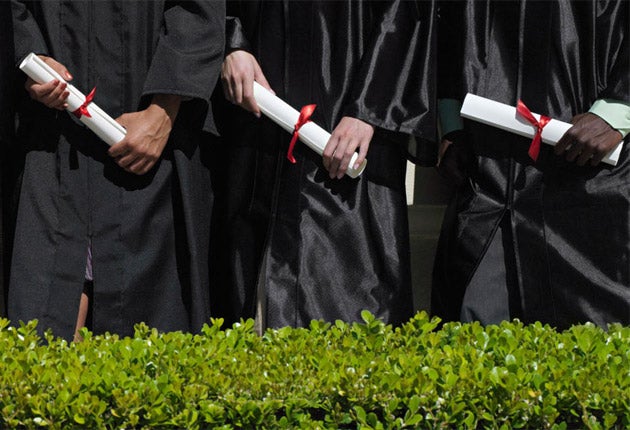Labour's campus revolution
Students given guaranteed access to lecturers and employment statistics of courses in return for higher fees

Plans for the biggest shake-up of universities for decades, including the first charter of rights for students, have been unveiled by the Government.
Many of the proposals in the blueprint for how higher education will look in 10 years' time will win cross-party support, ensuring they are seen through no matter who is running the country after the next general election.
The new rights package for students is widely viewed as a quid pro quo to give a better quality education in exchange for raising fees from their current cap of £3,225 a year. Under it, all future students will get a written guarantee of how much direct contact they can expect from staff, which will also show the employment record of previous students on their course.
The deal was hailed as "an important development" by a leading academic Professor Alan Smithers, of Buckingham University. "A lot of students find they have very little provided for them at university," he added.
However, other academics remain to be convinced. Professor David Watson, from the Institute of Education, said: "This route is full of risk. You don't just purchase a degree like you might a frozen meal or a car – you have to make it your own through putting in more than a fee."
The biggest controversy caused by the proposals – the most far reaching since the Robbins report of the mid-1960s recommended the expansion of higher education – will be Peter Mandelson's call for universities to stop relying on A-level results to determine admissions.
The Business Secretary made it clear that he does not want potential students to be turned down simply because they do not get top-grade passes at A-level – even by the most selective universities. "What we're saying is nobody should be disadvantaged or penalised on the basis of the families they come from or the schools they attend – and the way in which a simple assessment based on A-level results might exclude them," he said.
Lord Mandelson added that he wanted admissions tutors to consider "aptitude and ability, too". "Places should be decided on merit – it is just how you arrive at the assessment of merit we are questioning," he said.
He announced he was appointing Sir Martin Harris, head of the university admissions watchdog the Office For Fair Access (Offa), to lead an inquiry into how to improve participation from disadvantaged groups at the country's more selective universities.
Significantly, Sir Martin has been told to report by the spring, so his recommendations will be available for use in an election campaign. The results from the Government's inquiry into fees will not report until the summer.
Lord Mandelson said he would like universities to make more use of "contextualised data", such as the performance of the schools young people have come from as well as their home backgrounds. The report said: "Access to higher education remains significantly correlated with parental income and wealth." Lord Mandelson denied the proposals would make it harder for middle-class students to get into top universities. "There are middle-class children who don't perform well who have a strong aptitude and strong potential," he said.
The report highlights Leeds University as an example of a university which offers places to those from poorly performing schools with lower grades over high-flyers at successful secondaries.
However, Wendy Piatt, of the Russell Group of Universities, which represents leading research institutions like Oxford and Cambridge, said: "Academic achievement continues to be the key factor in determining whether a student will go on to university."
A third strand of the blueprint calls for tomorrow's universities to produce the skilled workforce necessary to compete in a 21st-century world economy. As a result, resources will be increased for so-called "Stem" subjects: science, technology, engineering and maths.
However, Lord Mandelson denied that arts and humanities subjects would suffer as a result.
Join our commenting forum
Join thought-provoking conversations, follow other Independent readers and see their replies
Comments
Bookmark popover
Removed from bookmarks